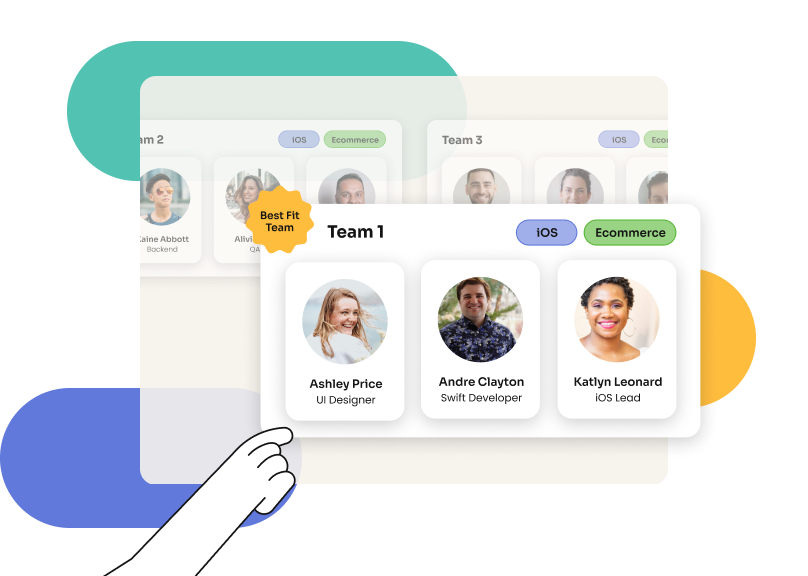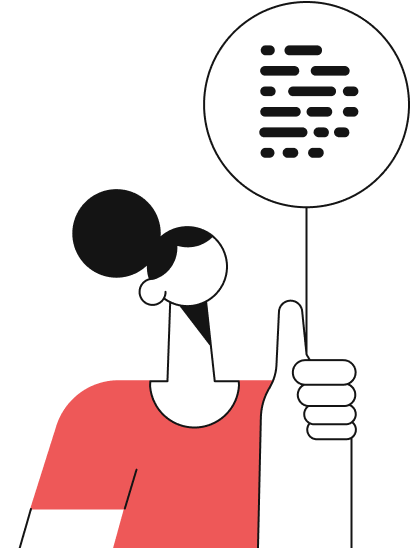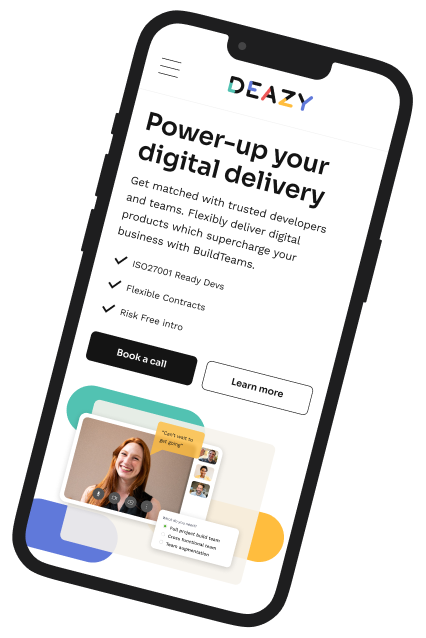Plug vetted, specialist GoLang developers into your squad, flexibly!
- ISO27001 Ready Devs
- Flexible Contracts
- Risk Free Intro Period

We support companies like



Also featured in




Get access to vetted GoLang developers today.
Deliver your GoLang projects using Deazy's ecosystem of pre-vetted, certified developers and development teams.
Say goodbye to capacity and skillset issues when delivering your GoLang project, by collaborating with 4,000+ vetted developers across Europe at nearshore commercials.
Our developers are typically placed on a 3, 6 or 12 month basis with discounts for longer commitments.
Fast, Easy
Hiring
Screen and hire a GoLang developer or a
full team in as little as 2 weeks
The Deazy platform makes delivery easy, automating, organising and streamlining every step of the process. We use smart algorithms to match projects with the best developer teams in seconds, so you can spend less time on admin and more time focusing on delivering your roadmap.
Top Quality
Developers
The Deazy ecosystem gives you access to top quality, vetted dev talent and teams.
Find developers, who have been certified on their technical ability, as well as reviewed on their culture and comms. And get started risk free with the Deazy swap out policy.
Ensuring the Right Fit
at Every Step
Deazy is more than just a GoLang developer marketplace.
Our experienced UK team oversee each project delivery ensuring everything runs smoothly. With experience including complex builds and high profile product launches - no project is too big or challenging for Deazy.
Trusted overtime
"The quality and flexibility of development teams from Deazy have helped support us across multiple product roadmaps."

Colin Woods
CTO, RAC"We just told Deazy what we wanted, and they've given us the solution. We tried a few different options, and Deazy was the strongest candidate."

Laing O’Rourke
CXO"We saw a 6x increase in our digital product delivery velocity. Working with Deazy allowed us to increase the overall quality of our digital products and made it easier for us to manage all of our systems as our business grew."

Elliot Gold
Co-founder, Work.life"Deazy’s speed is something we were really impressed with - being able to spin up a cross-functional team in a matter of days."

David Rowe
CTO, Deltabase"[Deazy] deliver on time and stay within budget. Their quality of work is excellent."

Marc Narbeth
Director, Fast Keys Services"The quality of the team's performance, what they could deliver for us, and the service that we got from the account team were their outstanding attributes. They became part of our cross-functional team."

Ian Nutt
Delivery Director, Kin + CartaHiring developers from Deazy
Is Easy!
01
Initiate the process by providing your project details.
Fill out our simple on-site briefing flow and chat through your
requirements with a helpful member of the Deazy team.
02
Receive project proposals and estimates via our platform.
View your project estimate, screen potential candidates and find the
perfect dev talent via Deazy’s automated platform.
03
Project commencement!
Get a developer or whole team working on your project in as little as
two weeks. Now all you have to do is sit back, relax and watch Deazy
do what we do best - making development easy!
Find a developer for your project
What is GoLang (Go)?
Go is an open-source computer programming language developed and supported by Google. It is used extensively in cloud-based programming, data science programs, game development, and server-side programming. It is increasingly being used in web development for web apps and back-end software development. The type of uses it is put to can be seen in the number of high-profile companies and services that are using it.
Since 2007, Google has been using Go throughout their organisation from site reliability engineering to content optimisation on the Chrome browser. While developed and maintained by Google, Go is open source leading to a high adoption rate outside of Google particularly in enterprise level services such as.
- CloudFlare – widely used in the provision of their DNS services.
- Bitly – The URL shortening service writes everything in Go.
- Meta – Facebook built a new framework in Go.
- Microsoft – The software giant uses Go to power some of its cloud infrastructure.
- Netflix – Uses Go to speed up processes handling tens of thousands of client connections.
- Salesforce – moved from Python/C to Go.
- American Express – Uses Go for payments and rewards service.
- Monzo – Built their whole bank using Go.
These are just a few of the major enterprise users and their use cases that can be investigated further than this article can provide at the Go website.
Although the correct name of the language is Go, the term Golang is used interchangeably by programmers and the wider public. According to the developers at Google, the name Golang was coined due to go.org not being available when the language was originally created.
Go is a mature language, developed for internal use at Google in 2007, released in 2009 to the public it became a fully open-source release in 2012.
Go use cases tend to be with large organisations that require large and complex computing requirements and programming needs, or in cloud services that have a lot of concurrent connections. As indicated by the uses above it is used across a wide range of software as a service (SaaS) provision as well as powering high profile products that are used globally by millions.
When developed by Google engineers it was born from the challenges faced by their engineers and programmers developing in C++, Python and JavaScript. While keeping useful characteristics of these languages they wanted something that could handle networking and multi-processing better than them. Speed and latency is at the heart of Go along with simplicity and minimalism in terms of writing the code.
Unlike Java and others which have grown to have huge specifications and high processing overheads due to many non-essential features and classes. These non-essential features and associated overheads are why Go exists, in pursuit of their efficiency targets Go creators built a simple straightforward language that provides everything required and nothing that is not.
Go is not used as much as Java, Python and C+ with only around 10% of developer responses to StackOverflow’s 2021 developer survey actively using Go compared to Javascript with 64% usage. However the same survey suggests that 63% of developers said that it was the most loved language putting it in the top 10 while it was #4 on the wish list of the same developer survey for most wanted.
The direction of travel for Go is clear within the developer community, beyond the statistics there are some often mentioned benefits of using Go for a project.
Usability:
Go is based on simplicity, one of its recognised advantages is ease of use and the clarity of syntax that some other programming languages lack. New programmers can quickly understand the language and can become proficient in a relatively short period while experienced developers can easily read code produced by others. This strictness and simplicity of the language as a whole provides a consistent programming framework & environment for creating applications and services that can be used to power a wide range of services or to be used to power smaller parts or a larger service.
Productivity:
Productivity is often the most cited reason for businesses using Go in development projects.
Depending on the project, using modern language means building fully tested, high quality applications and services can be completed in less time than with other toolsets. These productivity gains appeal to lean and agile development teams and the organisations they serve.
Flexibility:
Go’s non-platform specific nature allows you to create server applications, cloud services, DevOps and many more software applications and services using a single language. With the ability to create any application for any operating system, Go provides a cost-effective, client pleasing solution.
The simplicity of Go means developers spend far less time in documentation and testing than in alternative programming languages meaning the same developer can flexibly work in many projects simultaneously.
Speed:
Programs based on Golang are lightning fast, especially in comparison to other languages. Execution times and compilation speed are far quicker than Java and others due to Go compiling directly into machine code without the need for an intermediate process for translation, allowing best-in-class execution speeds and faster development.
Faster development speeds are helped along because Go includes a super testing framework as part of the language, this is a great asset for developers on fast moving projects and represents a great advantage over other languages. When it comes to meeting the requirements of faster back-end development Go is something of a “go to” solution for savvy development project managers.
Scalability:
Go is very scalable, given its history and the common use cases it is plain to see that it can handle high usage requirements efficiently and with ease. Concurrency is one of the driving forces for many organisations to switch to programming in Go. However modest the initial programming objective is, there is no fear of applications powered by Go being unable to scale. Future growth can be simplified by the choice of programming language used from the start of a project.
Open Source:
Like many other open-source projects, support from a community of developers means Go is stable, secure, and continually being improved. Developed and maintained by Google means that the future of Go is assured.
With so many enterprise level users including Google themselves, any potential bugs and security issues are spotted and dealt with before they make it into production. Go also benefits from more than just the generic open source positives, as it is continually supported and developed by Google departments and engineers.
Go developers design and develop software and other applications that use the Go Programming language
A skilled and accredited Go developer is fluent in coding with the language. Go is a super flexible language but it is structured differently from other languages. This means that sometimes it does not play so well with others. Using a dedicated Go developer means that they can overcome any such obstacles without delaying the project. While developers from other languages such as Java and C++ will find the transition to Go simple, only a certified and experienced programmer with Go skills will make the project run smoothly when faced with these kinds of issues.
A fully vetted and certified Go developer provides additional value to projects by leveraging the full power of the language. Highly skilled, experienced developers are able to ensure that the build and management of software applications for any platform runs smoothly and effectively. This ensures you can get outstanding results at the end of your project regardless of any dependencies and integrations required.
The same expert can also help overcome many project management challenges. By fully understanding the language in use and the desired deliverables, they can help predict, more accurately, how challenging, time consuming a project will be.
In order to ensure a successful outcome for your Go project it's important to work with a developer who is fully versed in the languages, it’s libraries and nuances. These skills are difficult to find, if you are looking to hire someone who is not directly familiar with Go.
As businesses increasingly adopt Go due to the aforementioned benefits, the demand for developers is high.
Due to Go’s growth and use in many back-end services across the web, cloud computing and other areas, the competition to find skilled developers is high. Companies of all sizes utilise Go to improve their development outcomes, from dedicated development companies to large enterprise level organisations whose whole business is built on Go.
With a limited pool of certified developers and massive demand for the skillset, hiring high quality Go certified developers is not only a time-consuming task but can also be an expensive affair. Attracting the best talent from the available pool is absolutely crucial to the success of an ambitious development roadmap.
Deazy’s unique, limitless ecosystem of pre-vetted, nearshore Go developers ensures you get access to intelligently matched, flexible talent. Whether you are looking to start a new project from scratch or to augment an existing in-house team, Deazy provides flexible access to top talent from 60+ tech stacks, including certified Go developers.
Deazy’s unique team-matching algorithm allows us to match your project or team augmentation requirements with developers who have experience in similar fields, prefer similar type engagements and enjoy working in your preferred team structure.
Deazy also screens all their teams for culture, comms, tech knowledge and certification, before adding them to Deazy’s ecosystem of available candidates. Any candidates who apply to your projects have already been approved as legitimate, and qualified. This means our team saves you time finding reliable Go developers who are well suited for your project before you even have to review CVs and project briefs.
Ready to
power up your
digital delivery?





.png)
.png)
.png)
.png)
.png)
.png)
-1.png)
.png)
.png)
.png)
.png)
.png)